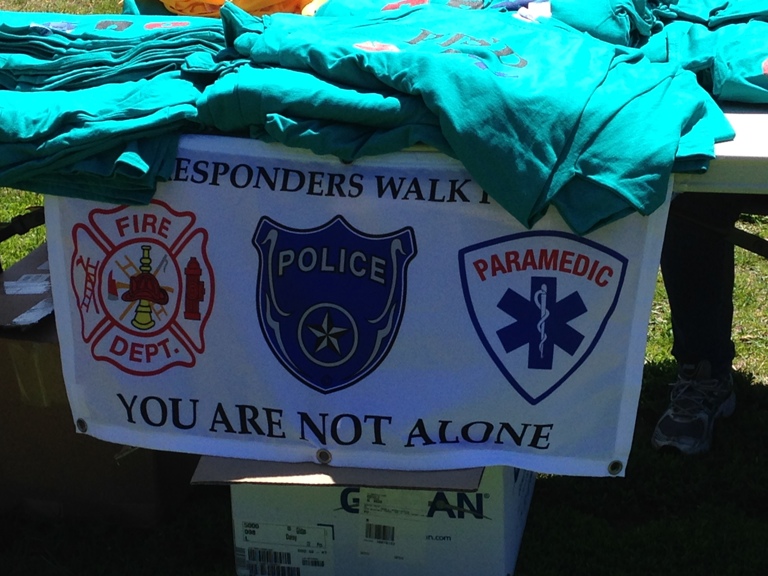HALIFAX – Approximately 50 people gathered in the Halifax Commons Saturday afternoon for the first-ever First Responders Walk for PTSD, post traumatic stress disorder.

Paramedics, police officers, firefighters, 911 dispatchers and their family and friends sported bright teal and yellow T-shirts to draw attention to PTSD and its effects.
READ MORE: 6 months, 23 first responder suicides – what are we doing to help?
Carol Bernardo, 34, is on leave from St. John Ambulance as a volunteer medical responder.
Three years ago, she was off-duty and getting off a bus when she encountered a young man who had been shot at the Dartmouth Bridge Terminal.
Bernardo said she could tell quickly that she was not coping with the incident the same way she did with other medical calls. She was diagnosed with PTSD a month later.
“At first it was a nightmare. It was a real nightmare,” she said.
“I had a lot of flashbacks. I would go for walks and I wouldn’t be present. I would wind up places and not know how I got there. A lot of nightmares. A lot of anxiety. It’s difficult.”
Bernardo said she pitched in at the Saturday event to draw attention to the condition.
“I want to give back and help other people know this is ok. This is normal actually. This is a human response. We’re not robots.”
‘You are not alone’

Get weekly health news
Paramedic Nicole Monaghan, who is also the public relations officer for the Nova Scotia Paramedics Union, organized the event.
“PTSD is a really serious and important illness that doesn’t really get recognized for the first responders as well as it does for some of the other people that are affected by it,” she said.
READ MORE: 4 Canadian first responders have killed themselves since New Year’s
Proceeds from the event will go towards the Tema Conter Memorial Trust. The organization provides support for first responders who develop PTSD.
Statistics from the Tema Conter Memorial Trust state that as of June 20, 2015, 23 first responder suicides and five military members in Canada have died by suicide.
Monaghan said she has not developed PTSD yet but understands it comes with the territory of being a paramedic.
“After seeing all the things we see, it compounds and eventually you can only take so much.”
Monaghan said the event is an opportunity for first responders in the area to recognize there is a support system.
“None of us are alone. You’re not alone. You have someone to talk to,” she said.
Global News recently reported on the PTSD crisis among first responders. Monaghan said the media attention thrust the issue into the spotlight and she wants to keep the conversation going.
RELATED: In Harm’s Way: The PTSD crisis among Canada’s first responders
“It’s always happened but it was covered up. It was hush hush. Now we’re trying to promote people talking about it so we can prevent it. We don’t want that to happen. That’s why we’re doing this.”
PTSD is a daily struggle for some
Heather Elliott was a 911 police dispatcher for 18 years before she was put on leave for PTSD.
“I had a number of calls that were traumatic,” she said.
RELATED: Is there enough mental health support for first responders?
Elliott said her PTSD was caused by an accumulation of calls over the years.
“The ones that are hardest for myself … are kid calls, children calling, and suicide calls. They’re hard calls to take,” she said.
Her PTSD manifested itself through involuntary shaking and nightmares, which she admits she still has.
Elliott received treatment through a psychologist, family doctor and occupational therapy but said every day is a struggle.
“I work on it every day. Some days are good. Some days are bad.”
Support from the community
Ahmed Elshair, a police officer with Halifax Regional Police, said he attended the walk to show his support for first responders.
“It affects a lot of people and not a lot of people know what PTSD even is. It’s more like ‘Oh my God, you have PTSD’ rather than ‘You have PTSD. What help can we get you?’ Something like this raises awareness and spreads the word,” he said.
Meanwhile Bobbie-Lynn Muirhead was there to show her support for her sister, who is an RCMP officer.
Muirhead said she hopes the Halifax community recognizes how serious the condition is.
“It’s a real thing. These people are putting their lives on the line every day and it does affect them,” she said.
As for Bernardo, she is still coping with her PTSD and admits she has good days and bad days but she wants to get back to being a medical responder.
“One foot in front of the other.”
If you, a family member or someone you know is having suicidal thoughts, or you believe they may be suffering from severe depression and/or anxiety, there are many organizations available to help including the Canadian Association for Suicide Prevention. A lengthy list can be found here.








Comments